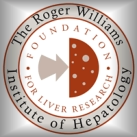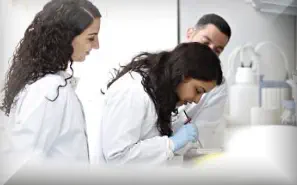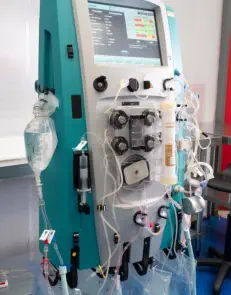
The Liver Life Project
Research






Where to Begin?
When it comes to the subject of liver research, it’s hard to know where to begin, as new advances are continuously evolving.
However, the biggest hurdle comes from the lack of funding from both the Government and private enterprises. Far more money is needed if we are going to
esolve the unacceptably high death rate due to liver disease, which is increasing exponentially year on year.

(Click on the logos to visit the site)
The Gut
There are a number of studies presently looking at and understanding the role the gut plays in liver disease. The Roger Willimans Institute of Hepatology at King’s
College, London, have been doing some remarkable work looking at the gut-liver-brain axis in chronic liver disease. The team is headed up by Prof Debbie
Shawcross.
In this rather lengthy “The Inside Matters” podcast from 2022 (1hr 15min), Prof Debbie Shawcross talks with Dr James McIlroy about Revolutionising Liver and Gut
Health: The Future of FMT and Diet.
I should point out to those who may be interested that there are some further excellent podcasts available in this “The Inside Matters” series, which can be found
here: https://insidematters.health/
NIHR Birmingham Biomedical Liver Research Centre
Transforming outcomes for patients with inflammatory liver disease through early diagnosis and developing new therapies.
The Liver Dialysis Machine
A news story dated the 20
th
of March 2025,
“Royal Free Hospital leads pivotal trial of a novel 'liver dialysis' machine for liver failure patients”.
A pivotal trial involving a new liver dialysis machine for patients with liver failure will get underway at the Royal Free Hospital (RFH) in
the early autumn.
The DIALIVE device will be used to help patients with a severe liver condition called acute-on-chronic liver failure (ACLF).
The condition often causes multi-organ failure, and many patients don’t survive.
DIALIVE works by removing toxins from patients’ blood and by exchanging ‘dysfunctional’ albumin for healthy albumin. This allows
the patient time for their liver to recover and regenerate so it can start functioning on its own.
A previous Europe-wide study showed the device is safe and offers benefits. The study indicated that for those treated with DIALIVE,
ACLF was resolved approximately twice as frequently and, significantly, more rapidly than those on standard treatments. The full
story can be found here: https://www.royalfree.nhs.uk/news/royal-free-hospital-leads-pivotal-trial-novel-liver-dialysis-machine-liver-
failure-patients#:~:text=A%20pivotal%20trial%20involving%20a,chronic%20liver%20failure%20(ACLF).
News of the Liver Dialysis Machine broke back in June 2023.

More Guts “
Ammonia build-up kills liver cells but can be prevented using existing drugs”.
For those who have been reading about Hepatic Encephalopathy (HE) as mentioned in the “Medical Consequences” section, you’ll know by now that the production
of ammonia in the gut is a natural occurrence. But what has recently been discovered is that high levels of ammonia kill liver cells by damaging the mitochondria that
power the cells.
Of the 100 million people in the world with cirrhosis (scarring of the liver), about three million are hospitalised with an episode of confusion or coma that is
associated with elevated ammonia levels in blood and brain tissues, with 10-15% of these expected to die within three months of the episode.
In promising news for these patients, the research demonstrated that an existing drug, called YAQ-005 (previously known as TAK-242), can halt damage to the
mitochondria in liver cells, allowing them to do their job of converting ammonia into urea so that it can be excreted as urine (a process called the urea cycle).
A phase II clinical trial for YAQ-005, which will be sponsored by Yaqrit and funded by a European Union grant, is due to begin recruiting patients with liver failure in
mid-2025, which will provide the first proof of concept for this treatment in human patients.
More about this can be found here: https://www.ucl.ac.uk/news/2025/mar/ammonia-build-kills-liver-cells-can-be-prevented-using-existing-drug
Troels Jordansen, CEO of Yaqrit, added: “We are looking forward to advancing this innovative drug, licensed from UCL, into phase II trials in acute-on-chronic liver
failure. This is a complicated life-threatening condition, and there is an urgent need for new approaches.”
And even more Gut Stuff - The “Boost” Trial
This study is being put together by Dr Ashwin Dhanda at Plymouth University.
In the gut (intestines), certain bacteria break down dietary fibre into short-chain fatty acids (SCFAs). SCFAs are
important for the proper function of cells lining the gut. Without them, the gut becomes leaky, letting parts of
bacteria into the bloodstream, leading directly to the liver. This triggers liver inflammation and scar formation. A
leaky gut, due to the breakdown of the gut lining, drives liver damage in cirrhosis.
Currently, there are no established treatments for liver scarring or leaky gut. Increasing gut SCFAs may be
effective in treating cirrhosis by restoring the gut lining. HMB, a naturally occurring substance that is already
available as a dietary supplement to increase muscle strength, also increases SCFA levels in the gut. In small test
trials, HMB was safe and had only minor side effects in people with cirrhosis.
The study is being carried out by experts in liver disease, dietetics and immunology from the University of
Plymouth, University of Southampton and Imperial College, London. The trial will be managed by Peninsula
Clinical Trials Unit (PenCTU). (Click on SCIBiTE to hear the podcast.)
More information can be found here: https://scitechdaily.com/could-a-gym-supplement-transform-liver-disease-treatment-a-new-clinical-trial/
Over in Australia
Similar work is being carried out at the QIMR Berghofer Medical Research Institute, Brisbane, Australia. Here, Prof Grant Ramm, Deputy Director of QIMR Berghofer
Medical Research Institute and head of the Hepatic Fibrosis Laboratory, said this finding could pave the way for new targeted therapeutics to treat both inherited
and acquired liver disease.

YAQRIT is a UCL spinout company dedicated to specialising in interventions in liver disease, based on 20 years of research and
development at the University College London (UCL). Their website can be found here: https://yaqrit.com/
Can Carbon beads help restore a healthy gut microbiome and reduce
liver disease progression?
The study has found that the carbon beads, licensed to UCL-spinout Yaqrit, were effective in restoring gut health and had
a positive impact on liver, kidney and brain function in rats and mice. They were also found to be safe for human use.
The next step will be to see if the same benefits can be realised in humans, which would pave the way for them to be
used to treat diseases linked to poor gut health.
Worldwide, it is estimated that around 100 million people living with cirrhosis of the liver, and 10 million have cirrhosis
plus an additional complication.
Explaining the current clinical challenges, senior author Professor Rajiv Jalan from the UCL Institute for Liver and Digestive
Health, said: “The influence of the gut microbiome on health is only just beginning to be fully appreciated. When the
balance of the microbiome is upset, ‘bad’ bacteria can proliferate and out-compete the ‘good’ bacteria that help keep the
gut healthy.
“One of the ways they do this is by excreting endotoxin, toxic metabolites and cytokines that transform the gut
environment to make it more favourable to them and hostile to good bacteria. These substances, particularly endotoxin,
can trigger gut inflammation and increase the leakiness of the gut wall, resulting in damage to other organs such as the
liver, kidneys and brain.
“In cirrhosis, a condition characterised by scarring of the liver, it is known that inflammation caused by endotoxins can
exacerbate liver damage. Part of the standard treatment for cirrhosis is antibiotics aimed at controlling bad bacteria, but
this comes with the risk of antibiotic resistance and is only used in late-stage disease.”
To overcome this, scientists at UCL, in collaboration with Yaqrit, developed tiny oral carbon beads that have a special
microscopic physical structure designed to adsorb both large and small molecules in the gut.
In the study, researchers from UCL tested the effectiveness of the carbon beads, known by the product name CARBALIVE, to restore gut health and assessed the
impact on liver, kidney and brain function in rats and mice.
They found that when ingested every day for several weeks, the beads were effective in preventing the progression of liver scarring and injury in animals with
cirrhosis, and reduced mortality in animals with acute-on-chronic-liver-failure (ACLF).
The beads were also tested on 28 cirrhosis patients and proved to be safe with negligible side effects. If the same benefits observed in animal models occur in
humans, the beads could be an important new tool to help tackle liver disease.
Michal Kowalski, a Vice President and the CARBALIVE product lead at Yaqrit, said: “These novel, engineered carbon beads, which are swallowed and pass through
the body unaltered, are smaller than a grain of salt. They work by absorbing the endotoxins and other metabolites produced by ‘bad’ bacteria in the gut, creating a
better environment for the good bacteria to flourish and helping to restore microbiome health. This prevents these toxins from leaching into other areas of the
body and causing damage, as they do in cirrhosis.
“The results in animal models are very positive, with a reduction in gut permeability, liver injury, as well as brain and kidney dysfunction.”
The results open the door for further trials to test the efficacy of the carbon beads in humans, one of which is due to start soon. If the beads are proven to be
effective at halting or slowing the progression of liver damage, they could be an invaluable tool for treating liver disease and possibly other conditions associated
with poor microbiome health.
Professor Rajiv Jalan, a Professor of Hepatology at UCL and consultant at the Royal Free Hospital, added: “I have high hopes that the positive impact of these carbon
beads in animal models will be seen in humans, which is exciting not just for the treatment of liver disease but potentially any health condition that is caused or
exacerbated by a gut microbiome that doesn’t work as it should. This might include conditions such as irritable bowel syndrome, for example, which is on the rise in
many countries.
Revolutionary Liver Organoids: A New Era in Research
These
are
very
exciting
times
for
liver
research.
I
can
see
there’s
going
to
be
a
big
explosion
over
the
next
few
years
as
new
technologies
and
medications
become
available. There will be an ever-increasing demand for those who have lived experience to become involved.
Liver
Organoids
are
just
one
of
the
areas
that
show
promise.
Liver
organoids
are
derived
from
human
iPS
cells
and
have
been
cultured
for
more
than
24
days.
(iPS
cells
are
a
type
of
stem
cell
that
can
be
generated
in
the
lab
from
adult
somatic
cells,
such
as
skin
or
blood
cells,
by
reprogramming
them
to
an
embryonic
stem
cell-
like state.)
This video was published earlier this year.












































